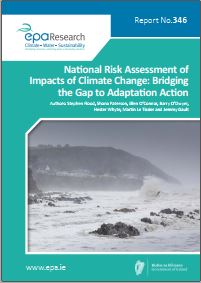Authors: Stephen Flood, Shona Paterson, Ellen O’Connor, Barry O’Dwyer, Hester Whyte, Martin LeTissier and Jeremy Gault
Summary: Ireland’s climate is changing in line with global trends and this trend is expected to continue. This report presents its findings according to the NAF’s four themes: natural and cultural capital, critical infrastructure, water resources and flood risk management, and public health. The impacts of climate change will have direct relevance to the achievement of planning and development objectives and priorities within these themes.

Watch the project highlights video
Ireland’s climate is changing in line with global trends and this trend is expected to continue and intensify into the future. Climate change will have wide-ranging effects on all aspects of Ireland’s society, environment and economy. The likely future impacts of climate change in Ireland in terms of physical changes relate to temperature, precipitation and sea level rise, with the most prominent risks associated with projected increases in extreme weather conditions and an increased likelihood of river and coastal flooding. Preliminary economic assessment of these risks has highlighted those risks with the potential to cause substantial disruptions to economic activity. These include the costs of flooding, disruptions to essential services (including threats to critical infrastructure), climate impacts outside Ireland, and effects of climate change on Irish society.
A clear message to the international community emerging from the recent United Nations Climate Change Conference (COP21) in Paris was the need for accelerated action to build climate resilience through risk-sensitive planning, and to advance risk assessment and management at local, national, sub-regional and regional levels. This recommendation is echoed in Ireland’s National Adaptation Framework (NAF), which identified risk assessment as a prerequisite for strategic planning for climate change, and in how Ireland is preparing to respond to climate change. Reflecting the requirements of Ireland’s NAF, the Climate Action Plan requires consideration of climate change impacts. Such information supports decision-making in relation to appropriate mitigation and adaptation actions for existing planning for future development by highlighting potential future impacts, vulnerabilities and risks.
Adapting Ireland to existing and future climate change impacts requires information not only on exposure to climate change and impacts but also on the vulnerability of people and communities to these impacts. Climate risk results from the interaction of hazards, exposure and vulnerability. While hazards are related to the physical aspect of risks (natural variability and anthropogenic climate change), exposure and vulnerability encompass socio-economic processes This national Climate Change Risk Assessment adopts a tiered assessment approach to capture the range of climate-driven risks across Irish society. This tiered approach provides a methodology to carry out an effective climate risk screening process in the face of a range of constraints linked with finances, personnel, time and data availability. In order to facilitate policy cohesion and alignment with Ireland’s NAF, this report presents its findings according to the NAF’s four themes: natural and cultural capital, critical infrastructure, water resources and flood risk management, and public health. The impacts of climate change will have direct relevance to the achievement of planning and development objectives and priorities within these themes.
https://www.epa.ie/media/epa-2020/publications/research/Thumbnail_346.jpg